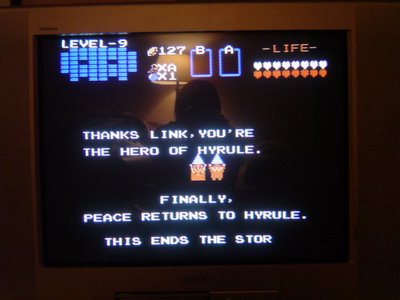 Mario Linkofsky (christened Philip Greenhorn) formed the one-man poetry collective, the Nintendo Power Poets, after he underwent a profound hypnosis prompted by the opening strains of the Legend of Zelda musical theme. He probably would have lived out a normative video-game playing childhood had his father not confiscated the family NES after witnessing the alarming behavioral impact the games had upon his children.
Mario Linkofsky (christened Philip Greenhorn) formed the one-man poetry collective, the Nintendo Power Poets, after he underwent a profound hypnosis prompted by the opening strains of the Legend of Zelda musical theme. He probably would have lived out a normative video-game playing childhood had his father not confiscated the family NES after witnessing the alarming behavioral impact the games had upon his children. "Father was convinced Nintendo was invented by the Japanese to control our minds," Linkosfky later wrote in a letter to his sister. "He was wrong, of course. But only that it was my soul, not my mind, that I surrendered."
Linkofsky's first literary efforts consisted of an album of folk songs protesting the totalitarian regime of Gannondorf, but audiences at coffeeshops and talent shows dismissed him as a novelty act. It wasn't until Linkofsky set aside the lute and turned all the way to verse before he received any recognition.
His first and only success came in a chapbook he called, "Hyrulian Sonnets," which were essentially Homeric Hymns addressed to Zelda in the form of Italian sonnets. Among the most popular was the 1999 poem, "You rule, Hyrule."
I wonder today with a youthful pain
What lay beyond the purple waterfall
The allure of lost landscapes, monsters and all
No lyrical tribute can contain
Let me go back to Hyrule once again
Where warp whistles whisk me away with their call
To lost lakes, sylvan glades and dungeon halls
All the fair lands under Zelda's reign
Oh pixilated princess, I will save you
I'll set sail in a raft across the ocean
On a quest for Triforce; a search for truth
I'll swing my sword and swig healing potion
climb Death Mountain just to enjoy the view
while relishing my Hyrulian youth
Unfortunately for the Power Poets and the entire Nintendo Lit subculture, Linkofsky's later efforts were less evocative, with a series of tone-poems entitled "Odes to Dodongo" bordering on the embarrassing. By the publication of his only 2002 novella, "A Wrong Turn on Rainbow Road," his unabashed glorification of Don Flamingo as masculine idyll had besmirched his reputation, and he died rupeeless in a Parisian prison under the name Sebastian Melmouth.




No comments:
Post a Comment